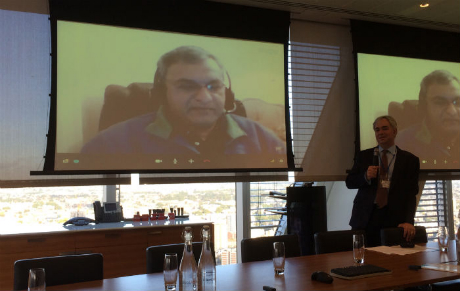Kim Dotcom may be seen as a villainous pirate-king by the creative industries, but his Mega cloud storage service is attracting white-collar professionals, according to its chief executive Vikram Kumar.
“The segment that seems to be most interested in Mega, and in paying for space, security and privacy tends to be professionals,” Kumar told the Copyright and Technology conference in London this morning, beaming in for his keynote interview via Skype.
“Accountants, lawyers, financial advisers, architects… These are people that want to use the internet, are concerned that their confidential client information may get compromised, and who are willing to pay for security and privacy online.”
Dotcom launched Mega in January 2013, a year after his previous company MegaUpload was taken down after a police raid. He recruited telecoms exec Kumar in February as CEO of the new company, leaving Dotcom to continue fighting US charges of criminal copyright infringement, while working on a digital music service called Baboom.
Kumar was keen to stress Mega’s credentials as a law-abiding service. “The simplest explanation of Mega, particularly for those people who’ve used Dropbox is that its a secure and faster Dropbox,” he said. “It’s essentially a cloud storage company, but in the future it wants to become more of a cloud collaboration and communication company.”
He also stressed that the service, which has 5m customers so far, is currently attracting a very small number of copyright takedown notices from rightsholders. “Mega has on average about 2-3m files uploaded each day, and we get around 100 takedown notices for alleged copyright infringement every day,” he said.
“That’s a very very small number for any online service provider. In comparison, YouTube gets 15m takedown requests every month, so the numbers tell us that Mega is not being used for wide-scale copyright infringement.”
One of Mega’s main selling points is its end-to-end encryption technology, with the company promising users that since their files are encrypted on their devices before being uploaded, Mega never sees the decrypted versions – and nobody does unless the uploader gives them the decryption key.
The obvious question is whether this is the real reason Mega gets so few takedown requests: copyright owners can’t see infringing files being shared on the service if they don’t have the keys, unlike the technologies and partners they use to detect infringement on other online services?
Kumar suggested that if rightsholders’ main concern is their music, films or TV shows being shared, they’ll still be able to spot this infringement, since it requires decryption keys to be shared publicly. However, he added that Mega intends to crack down on external search engines claiming to index files stored on the service.
“Let’s be quite clear: Mega doesn’t want that happening. We don’t think search indexes or anything that encourages copyright infringement or illegal use of the service should exist,” he said.
“We don’t want those websites out there, and to the extend that we can do anything about it, if they’re using ‘Mega’ in a way that conveys the impression to people that it’s linked to the company, we are able to take action either for trademark violation, passing off or fraud.”

Mega CEO Vikram Kumar Skyped in for his Copyright and Technology interview
Mega isn’t planning to add features that could be seen either as facilitating copyright infringement, or which would require licensing deals with copyright owners: for example, the ability for people to stream music or films directly from their Mega storage, even if they own them.
“We are quite clear that we don’t want to have files that are uploaded stored and that can be streamed as an audio or video from Mega, because that’s not Mega’s purpose,” he said.
Kumar criticised rightsholders for their approach to copyright takedowns with other companies, suggesting that the automated nature of both sending takedown notices (for rightsholders) and acting on them (for services like YouTube) leaves the process open to false positives.
“There are a large number of copyright notices being sent that would truly not stand up to scrutiny in a court of law,” he said. “Most service providers are so afraid, they act on every copyright notice. So I think there is a fair amount of files being taken down which, if they were examined individually, would not stand up to scrutiny as meeting the bar for takedown.”
Kumar hinted at big plans ahead for Mega to provide storage for other web services, apps and even consumer electronics devices, citing the example of an unnamed manufacturer that’s using Mega as the cloud storage provider for its connected TVs.
“It has no storage, it has no place to keep any files. So what they do: the apps connect with Mega in the back-end, for storage,” he said.
“If you have a digital video recorder, which time-shifts recordings, the TV can’t store the time-shifted recordings anywhere, so it stores them on Mega’s cloud storage, and pulls them down whenever it needs it.”
Kumar smiled at a follow-up question on how pay-TV providers might respond to this kind of feature, if it starts to disintermediate their own services and hardware.
“I think there’s a lot of industries that have got disintermediated by the internet and cloud systems,” he said. “There hasn’t been that much shakeup in the TV industry. I see that coming in the next 2-3 years. Am I concerned? Probably not. As a customer, I would enjoy that.”
Kim Dotcom’s Mega ‘not being used for wide-scale copyright infringement‘ - The Guardian
http://news.google.com/news/url?sa=t&fd=R&usg=AFQjCNFlGNIAvuFTwZC-R000Q1q8bha0UQ&url=http://www.theguardian.com/technology/2013/oct/17/kim-dotcom-mega-vikram-kumar-piracy
copyright infringement news - Google News
Social tagging: cloud storage > copyright infringement > kim dotcom > scale copyright > takedown notices




